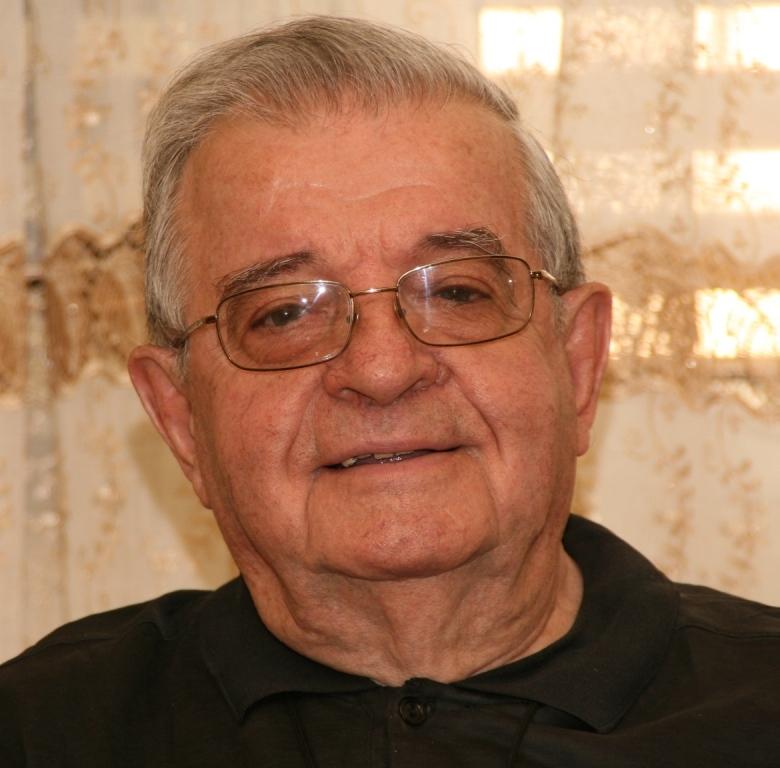Daniel Comboni
Comboni Missionaries
Institutional area
Other links
Newsletter
In Pace Christi
Menegazzo Antonio
Antonio was born on 13 September 1931, in Cittadella, in the province of Padua, the fifth of seven children. In 1937 he entered the junior seminary of the Comboni missionaries in Padua and then went to the novitiate in Florence where he took first vows on 9 September 1950. He continued his studies at Rebbio (Como) and in Venegono where he studied philosophy and theology. On 9 September 1956 he took perpetual vows and on 15 June 1957 he was ordained priest in Milan by Cardinal Giovanni Battista Montini, the future Pope Paul VI.
Immediately after his ordination he commenced his mission at the parish of Kadugli, first as curate and the following year as parish priest. He also served as superior from 1961 to 1963. He was afterwards sent to El Fasher in Darfur, and, in 1967, to the parish of St. George at En Nahud where he soon became well known among the largely non-Christian people.
In 1974 Fr. Antonio was transferred to Port Sudan in the extreme east of the Red Sea region where there was much work to be done among the migrant workers, Eritrean refugees and the prestigious Comboni Secondary S. From 1975 to 1984 he worked at Khartoum cathedral with Mons. Agostino Baroni who wanted a strong and energetic priest for his new archdiocese. The diocese included all North Sudan and had an area of 1,750,000 Km2.
In 1976 Fr. Antonio was elected Vicar General and was given the task of visiting the parishes, schools, communities of women religious, hospitals and houses of formation and to meet the religious and secular priests of the diocese; he was also superior at the cathedral and was elected vice-regional superior.
On the hundredth anniversary of the death of Daniel Comboni (10 October 1981), Mons. Baroni wisely decided to hand over the diocese to a young bishop, native of Sudan. That decision definitively changed the face of the Catholic Church in Sudan. With the appointment of Gabriel Zubeir, the first indigenous bishop of Khartoum, the process of Sudanisation of the Church in North Sudan began. Mons. Zubeir took office on 10 October 1981, with his see at Khartoum. Fr. Antonio helped the new archbishop to administer the immense diocese. With the increasing pastoral work, the archbishop could see the need to divide the diocese geographical so he created a pastoral region centred in the city of Kosti: Fr. Antonio was placed in charge of that region and was given the title of Episcopal Vicar. His mandate was characterised by the spread of the Church and growth in faith.
In 1992 he was appointed Apostolic Administrator of El Obeid by the Holy See and, in 1996, was consecrated Bishop with the title of Mesarfelta. The diocese of El Obeid included three regions: North Kordofan, South Kordofan and Darfur, with an area of around 888,000 Km2.
The organisation of such a diocese with its many pastoral needs was not an easy task, even though the region was not altogether new to Mons. Menegazzo who had worked there in 1960 and 1970. He renewed contacts with his former parishioners and established relations with non-Christians. He started many new projects and completed those begun by his predecessor.
It was at a time when the whole country was undergoing severe Islamisation. The missionaries were limited in their movements and their visas were cancelled for no good reason. Priests and men and women religious were kept under control by government personnel. Some influential lay people were arrested because they had remained Christian. The Catholic schools were closed. Even though the Church was not involved in the civil war that took place from 1983 to 2005, it was under attack because of its stance with respect to human rights. With the coming of pace and calm in most of the diocese of El-Obeid, Mons. Menegazzo began the construction of churches.
We remember him for his simplicity and his closeness to the needy in the more difficult moments and the great humanity of his that he showed in his numerous pastoral visits and in his many letters. His most memorable address was that of Easter 2006 in which Mons. Menegazzo tackled the question of post-war reconciliation, exhorting his faithful to forgiveness and the friendly resolution of problems. The message was sent out in Arabic, English and Dinka and was widely read in churches and used in catechism lessons.
On 15 August 2010, when the new bishop was ordained, Mons. Menegazzo ended his mandate in Sudan and returned to Italy where he settled in his native parish of Cittadella. There he continued to exercise his ministry until his death on 20 March 2019. His funeral took place in the cathedral of the city on Monday 25 March with the Bishop of Padua, Monsignor Claudio Cipolla presiding, accompanied by his predecessor Mons. A. Mattiazzo, an African bishop from Tanzania and more than sixty concelebrating priests of whom fifteen were Combonis, including Superior General Fr. Tesfaye Tadesse and the provincial Superior Fr. Giovanni Munari. The church was packed and among the congregation there were various representatives of the civil authorities and parish associations. His remains were interred in the crypt reserved for diocesan priests in the cemetery of Cittadella.
Da Mccj Bulletin n. 282 Suppl. In Memoriam, gennaio 2020 pp. 21-35.

